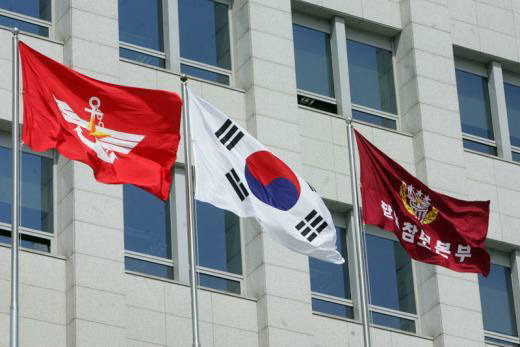Since the Syngman Rhee administration in 1950, the South Korean government has had the authority to issue a decree and mobilize the armed forces in order to maintain public order in the event of disasters and emergencies.
But the “garrison decree” has often been criticized as an excuse to suppress democratic protests, such as during the authoritarian administration of the 1970s. The late President Park Chung-hee mobilized troops several times to crack down on anti-government protestors.
Now the 68-year-old law is to be abolished amid controversy that the Ministry of National Defense had considered invoking the decree to suppress the candlelight demonstrations last year. The movement resulted in the ouster of former President Park Geun-hye, who is on trial for bribery and extortion.
“The Ministry of National Defense deems the garrison decree to be unconstitutional and unlawful. We will abolish it in accordance with relevant procedures,” the ministry said in a statement.
 |
South Korea`s Ministry of National Defense. yonhap |
The announcement came after an allegation raised by a progressive lawmaker and civil rights group that then-Defense Minister Han Min-koo had ordered the military to examine the requirement for invoking the garrison decree when the candlelight demonstrations reached their peak in February last year.
Im Tae-hoon, director of the Center for Military Human Rights Korea, even claimed that the commander of the Capital Defense Command had discussed a plan to commit troops to Seoul in the event that Park’s impeachment failed to clear the Constitutional Court.
Rep. Rhee Cheol-hee of the ruling Democratic Party of Korea asserted that Minister Han had refused to accept the military’s recommendation for abolishing the garrison decree due to the military confrontation with North Korea.
“I think there is reasonable doubt,” said the liberal-minded lawmaker. “It’s difficult to interpret in a positive way that the military had reviewed a plan to mobilize troops during the candlelight demonstrations.”
The Defense Ministry dismissed the allegation, saying there was no such discussion about using force to crack down on protestors by invoking the garrison decree, which it says it reported to Han as clashing with the Constitution and violating people’s basic rights.
While there was a document drafted by the Capital Defense Command concerning the candlelight demonstrations, the military said it was a merely a contingency plan in the event protestors breached the perimeter of the presidential compound in downtown Seoul.
“Everyone under these circumstances understands it doesn’t make sense for the military to issue the garrison decree,” a Defense Ministry official told reporters under customary condition of anonymity. “It’s simply not true that there was consideration to mobilize troops under the garrison decree.
By Yeo Jun-suk(
jasonyeo@heraldcorp.com)








